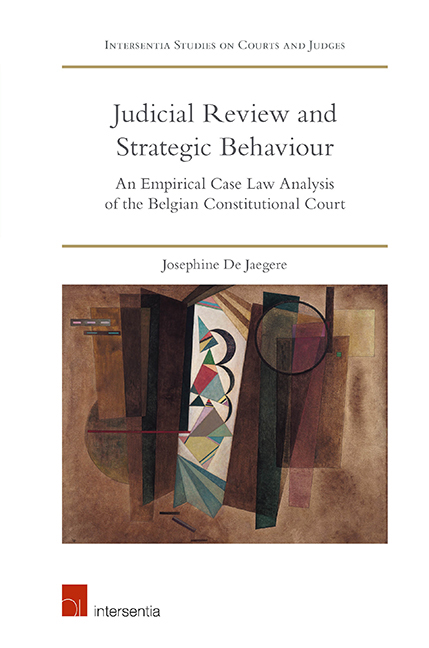 Judicial Review and Strategic Behaviour
Judicial Review and Strategic Behaviour Book contents
- Frontmatter
- Foreword
- Acknowledgements
- Contents
- Introduction
- PART I NORMATIVE FRAMEWORK: THE DELIBERATIVE PERFORMANCE OF CONSTITUTIONAL COURTS
- PART II THE CONTOURS OF JUDICIAL DECISION-MAKING
- PART III EMPIRICAL ANALYSIS OF THE BELGIAN CONSTITUTIONAL COURT'S CASE LAW
- Chapter 4 Translating Case Salience into Measurable Explanatory Variables
- Chapter 5 Case Outcomes
- Chapter 6 Citation Practices
- Chapter 7 Proportionality Analysis
- Conclusion
- Codebook
- Bibliography
- Index
- About The Author
Chapter 7 - Proportionality Analysis
from PART III - EMPIRICAL ANALYSIS OF THE BELGIAN CONSTITUTIONAL COURT'S CASE LAW
Published online by Cambridge University Press: 26 June 2019
- Frontmatter
- Foreword
- Acknowledgements
- Contents
- Introduction
- PART I NORMATIVE FRAMEWORK: THE DELIBERATIVE PERFORMANCE OF CONSTITUTIONAL COURTS
- PART II THE CONTOURS OF JUDICIAL DECISION-MAKING
- PART III EMPIRICAL ANALYSIS OF THE BELGIAN CONSTITUTIONAL COURT'S CASE LAW
- Chapter 4 Translating Case Salience into Measurable Explanatory Variables
- Chapter 5 Case Outcomes
- Chapter 6 Citation Practices
- Chapter 7 Proportionality Analysis
- Conclusion
- Codebook
- Bibliography
- Index
- About The Author
Summary
INTRODUCTION
In the previous section, the manner in which a constitutional court can strengthen a ruling's justificatory ground by referring to relevant, persuasive authorities was explored. However, a proper use of citations is not the only way to build a clear, convincing reason-giving. In this chapter, the focus is on the structure of the justificatory ground, and in particular on the application of the proportionality analysis as an argumentative framework in fundamental rights adjudication. In short, this framework sets out the conditions for a limitation of a constitutionally protected right to be permissible. Essentially, the interference with this right should be reasonably justified. This justification test consists of four stages, exploring whether: (1) the legislation pursues a legitimate goal; (2) there is a causal relation between the provision and the policy goal (suitability stage); (3) the measure infringes fundamental rights no more than necessary to accomplish this goal (necessity stage); and (4) the measure does not have a disproportionately severe effect on the persons to whom it applies (proportionality stage sensu stricto). In principle, each step is assessed cumulatively, and failure of a measure to comply with one of the steps will render the measure unjustified. This four-stage test has become the most prominent method for adjudicating in fundamental rights cases around the world.
It gives courts the possibility of evaluating the reasonableness of legislation. Although the review method is not without its critics, it is usually praised as a way to ensure that legal measures are not excessive in relation to the social problems they are intended to solve.
Importantly, the proportionality analysis leaves considerable room for judicial discretion. Instead of adhering to strict manifestations of the law, a court can move within the – not so strictly defined – boundaries of the justification test. Therefore, it is important to understand which factors and processes may influence its application in practice.
- Type
- Chapter
- Information
- Judicial Review and Strategic BehaviourAn Empirical Case Law Analysis of the Belgian Constitutional Court, pp. 283 - 326Publisher: IntersentiaPrint publication year: 2019


